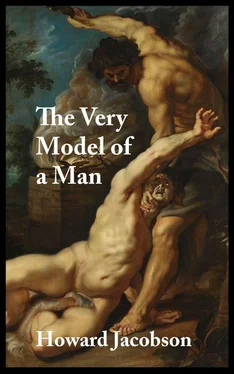Mouldy.
And senses that everything is conspiring to make him mouldier.
His last session in the recital room hasn’t helped. His last session in the recital room never helps. Like all obsessive autobiographers, on a public stage or in a private diary, he feels even more ill when he has disgorged himself than when he hasn’t, and he feels ill enough when he hasn’t. The reason for this is to be explained by another Yiddish word — kishkas. Entrails. Obsessive autobiographers suffer from a psychological ailment centred on their kishkas. They cannot bear to leave them in and they cannot bear to drag them out. The first — containment — results in an unacceptable sensation of costiveness and obstruction; the second — extrusion, unravelling — is nothing short of cannibalism of the self.
You are going to feel queasy either way.
But this is a general complaint, routinely incident to Cain’s calling, and is not a specific cause of the fungi which he believes to be gaining on him no matter how frequently he bathes. So what is?
First and foremost, he blames his past. The past will grow like mould, of course, in the mind of any man who keeps his memory warm and damp enough. But in Cain’s case, the chamber where he cultivates remembrances of his childhood, of his parents, of his native mud, can be likened to a hothouse. He acknowledges his own hand, his own architecture, in this. He doesn’t have to grow such gorged, primeval blooms. Take as an example the story he has just told about his father’s dust-and-water paste, the bitter potion that reacts adversely to unchastity: there is another way he could relate it. He could wipe the dirt of ages off it; hold it to the light; show the shrewd humanity of a ritual capable of calming the mental fears of husbands without doing physical damage to the wives. ‘Don’t you see,’ he could tell his bewildered Babel audiences, ‘no thigh is going to rot whatever the woman’s done. The thing works precisely because it doesn’t. You may wonder whether you have as subtle a method for solving martial differences in your scimitar.’
Similarly, it isn’t necessary for him to be so hard on his mother’s flight into spiritual darkness. There is something to be said for inhabiting the gloomy corners of yourself; there are surprises to be gleaned there, jewels of the soul that only those willing to mine underground will ever find. The sun is not the only source of light. In Babel especially, where there is a craze for incandescence, it should be just the sort of mission Cain likes, to press the claims of night.
But he is in Babel as a vagabond, not as a proselytiser. He is in love with his own vagrancy. Would be in love with his own vagrancy. Which means that he must wash his hands of home. If he is truly to be a new thing, with a new head for Babel’s heights, and new lungs to breathe in Babel’s thin clear air, he has to obfuscate his past. And here’s the catch: the more he obfuscates his past, the more it grows on him like moss.
‘Serves you right,’ the poet Preplen scoffs at him. ‘What are you doing hoping to be moss-free, you who grew out of the bogs of Eden? Where’s your patriotism?’
Preplen is another agent in Cain’s mouldering. Preplen’s letter, with its queer claims of consanguinity, another putrescence he would like the Anatolians to wash off him. Preplen’s denunciation of his treason and triviality, accusing him of caring only how spruce he looks in the eyes of Shinarites, still more reason for Cain to care how spruce he looks in the eyes of Shinarites.
And then there is the mad prophet, trailing after him on rotten feet, muttering about heroic lawlessness, bursting in on his philandering (itself a sort of mould of the affections) and turning up at his recitals with eyes wetter than a dog’s.
Let’s leave everything else aside. On his own, Sisobk the Scryer is enough to keep Cain confined to the barber’s chair, blasted with antiquity, eating towels.
He isn’t a cause of Cain’s spongy fungoid blight — he is Cain’s spongy fungoid blight.
Sisobk the Stale. Omar the Obsolete. Marduk the Mildewed.
*
Barring exceptional circumstances, there are only two reasons why a man of marriageable age remains a bachelor: either he doesn’t love women at all, or he loves them too much.
Our maligned friend the Scryer is a bachelor of the second category. He esteems women so highly, has such a pure regard for them in the abstract — as woman — that any thought of taking one for himself would be killed at birth, as a miscreation. Instead, he holds torches for them, lights candles to them, prophesies happy futures for them where he can, and even tries to keep his mind still while they’re talking to him.
Among the women he lights candles to are his great-great-grandmothers and great-great-great-aunts, the widows of all those morbid ancestors of his who couldn’t wait for their fatality to ripen but had to hurl themselves, before their time, into the jaws of anything with teeth. He sits them, in their weeds, on mourning stools — a long row of identical faces protruding from each end of his unlocked imagination — and agitates them into every known attitude of womanly distress. They weep, they wail, they keen, they pull their hair, they gouge their flesh, they rend their garments — especially they rend their garments — they call for salts, for opiates, for death itself. Sisobk the Scryer loves women so much that they cannot be too deranged, too distraught or too delirious for his taste.
Or too damaged.
Those he holds a torch for are seldom in one piece. When he isn’t chasing Cain or second-sighting scripture, he visits homes for invalids, hospices, asylums, where there are fragments of forgotten women to be comforted. Babel mislays its old and its imperfect as cheerfully as it lets slip its past, so there is no shortage of infirmaries for Sisobk to haunt. He isn’t the ideal person to have tramping wards and sitting on the edge of sick-beds: he isn’t ideally clean; he isn’t — with his bear’s shoulders, and his circular boy’s face, and his trickle of a moustache, and his squashed sultana eyes — ideally encouraging. But it is surprising how many decomposing women with a hand left to hold will let anybody hold it, not excluding Sisobk the Scryer.
He loves women too much to tell them he loves them, even though that may be the last sentence they ever hear. Yet he has many a time left a death-bed convinced in his heart that a promise of bliss has just been snatched from him, which he didn’t know existed an hour before.
Small wonder, then, if his first sight of Zilpah, pecking at Cain’s brain, made a strong impression on him. To Cain’s eye the girl might have been a mere transparency — a row of buttons, a spinal column and a braid; by Sisobk’s standards she was blooming.
He didn’t love her. He didn’t, that’s to say, discretely love her. He beheld her in her individual woman’s glory, which confirmed the high esteem in which he held the species, the subgenus — that was all. But he loved Cain for loving her. Saw it as a vindication of his idolatry, and also as an additional bond between them, that Cain loved women as much as he did. ‘Just let me hold your hand,’ he had pleaded, ‘just let me hold both your hands,’ as Cain was kicking him out.
At least on this occasion he didn’t take Cain’s lukewarm hospitality personally. Of course the first-murderer wanted to be alone with the woman. Of course he didn’t want acolytes and apostles barging in on him while he was drying tears, offering words of comfort, lighting candles and otherwise prosecuting his amours. Sisobk understood all this. And smiles to himself whenever he thinks about it. That Cain! Incorrigible! He still wishes he’d been allowed to hold the fratricide’s hand for a second — both their hands — but he understands, he understands. That Cain!
Читать дальше











